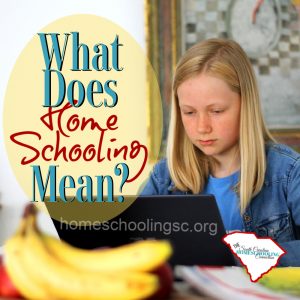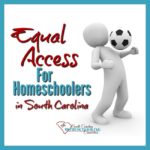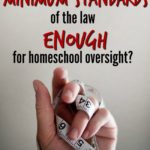Let’s talk about Education Scholarship Accounts in South Carolina Legislation. This post has been updated for 2023-2024 Legislative Session. The bill sailed thru this session, passed and was signed into law effective for the 2024-2025 school year. This funding is also known in other states as Education Scholarschip account or ESAs. In SC, it’s called Education Scholarship Trust Fund.
The Education Scholarship Account has been proposed in previous SC legislative sessions since 2015. Recent alerts have circulated about the school choice expansion bill that made it seem suddenly new. I don’t think it’s going to encroach on our rights. But, I do think it’s going to affect us–and it’s really important for us to be aware and prepared.
Let’s talk about what Education Scholarship Account is all about. What is the problem it’s trying to solve? How does it work? And how does it actually affect us?
Some families’ only school option is to attend public school. There is no other choice because the parents cannot afford private school tuition or private therapies. They can’t afford a home computer or home curriculums to DIY a home education.
The scholarship programs are proposing to provide choices of alternative educational opportunities for those who currently don’t have any other options.
Summarizing Education Scholarship Accounts
The main idea is to divert some of the funding that would be allocated to the public school based on the per student allocation. Individual participants are able to apply for this funding instead. The money is held in a Class Wallet spending account. Various service providers need to apply as approved vendors. The money is paid directly to the approved vendor. Partipants cannot be reimbursed for out-of-pocket expenses.
Vendors include independant schools (in-person or online), texbooks/curriculum/educational items, tutoring/classes (in-person or online), computers/technology devices, exams, educational therapy services (speech, physical, occupational, vision, ABA). The vendors have to apply to be in the program.
The parent can choose to take their scholarship to a local or online private school. Or they can customize their own program from a variety of providers (aka homeschooling).
Advocates for the program explain it as a “4th option” to homeschool. In the same way that the 3rd Option doesn’t encroach on Option 1 or 2. The goal is to give more students a chance to succeed. Some families really could use the financial assistance. I initially supported this idea, with the understanding that there would be equivalent academic oversights. Each proposed version of this legislation has not clarified the parameters of academic accountability for the “4th option”.
Pushback on this idea comes from all sides. Public school supporters are rightfully concerned about the budget and how it will impact the schools that are already underfunded. Some private schools have expressed concerns over certain regulations. But many of them are already participating in Exceptional SC Scholarship, which utilizes private donations under state oversight with similar regulations and policies.
Homeschool advocates have expressed a variety of concerns. The primary collective outrage is about how it affects *my homeschool*. It’s going to make *me* use specific curriculums or standards and lead us down a slippery slope of government overreach. This is a misunderstanding about how the program works. We had similar resistance against equal access legislation years ago.
Individuals and vendors who wish to participate in this new scholarship program must apply. Others who don’t want the financial or academic oversight should not apply.
I don’t see the problem about how it affects *me* in my house. What I do to educate my own family is not affected.
The problem is a foundational misunderstanding of the variations of homeschooling requirements from state-to-state. This problem will affect our homeschool communities and really matters for the participants. I’m concerned for *them*.
The model program was established in Arizona in 2011. In order to homeschool in that state, the parent files a one-time declaration of intent with the Department of Education. However in SC, the parent has some basic record-keeping and attendance requirements to be completed each year.
Our law wants someone to hold the parent accountable with annual compliance verification. Parents must register with one of the accountability agencies. If this is a 4th way to homeschool, then the participants should have equivalent standards and it should be clearly stated what is their academic accountability.
Our homeschool community has been so concerned that individual accountability requirements would increase. But, I’ve actually been more concerned that they have less requirements than our homeschool law states. They’re given a wallet full of spending money without equivalent accountability standards as current homeschoolers. Public money is going to private use with less academic standards than any of us have.
With so much confusion amongst homeschoolers, the initial rollout in South Carolina eliminated all reference to homeschooling codes of law. The understanding was to come back to expand the program following the same rollout pattern as Arizona and other states. Just get a start with independent school providers and cut out homeschool options.
Launching in SC 2024-2025
The scholarship bill passed into law in May 2023. The new program is open in SC for 2024-2025 school year as Education Scholarship Trust Fund (ESTF). Read all the details here. As stated on Department of Ed website, this scholarship allows families to “create a customized, flexible education for their child.”
Uh. Hold on. That sounds like homeschooling to me still. Let’s look closer at the policies and applications for individual participants and vendors.
Participation was limited to first 5,000 applicants. With an ESTF, parents can direct the state’s education funding for their child into school tuition, books, therapies and services of their choice.
Applicants must be a residents of SC, currently enrolled in public schools or just turning five and qualify for low-income. I thought it said for students with disabilities, but I don’t see that qualification actually stated now. Submit proof of guardianship, proof of income, and proof of residency.
I have been looking for the policy manual that can clarify the academic requirements and where is their accountability for this. There’s instructions about how the spending account works and a list of approved service providers.
Vendors may apply who offer these goods and/or services: Independent schools (in person in SC). or Independent Schools online, textbooks/curriculum/educational items, Tutoring (in-person or online), Computers/Technology devices, Online Classes, Education Therapies/Services, Transportation, Financial Management Firms.
It is not even clear if they’re required to register full time somewhere. I think we should be concerned about nomad homeschoolers wandering around without academic accountability for their “custom, flexible education plan.”
The lines have become very blurry with the rise of options outside the traditional brick-mortar local school. Microschools, hybrid programs, online programs based in other states. It’s already very confusing when we’re paying out-of-pocket what meets the requirements of compulsory attendance in SC. SC Law has not caught up to these variations. Exemption for compulsory attendance is provided under the homeschool code of law (there’s three options available).
Our 3rd Option Association Directors spend the vast majority of time helping new homeschoolers plan out their course of study. Imagine you never cooked before and ran into the grocery store to ask what you should cook for dinner. They need someone to help advise them. In addition, associations assist with official paperwork like Disability Services paperwork, DSS investigations/custody disputes, DMV/auto insurance verifications, Equal Access for sports, high school transcripts/diplomas and more. But, associations are expressly prohibited from registering as a vendor.
All the information for questions about the program is handled by Class Wallet. So, when I asked if there are any guidance counselor programs on the list, they asked what state. They don’t have any answers about our policy requirements in SC, just the accounting policies and procedures on how to shop.
I decided to go ahead and apply as an independant consultant, that’s part of what I do with this blog anyway. The application doesn’t have a category for this kind of service. It’s only for direct services in contact with the student. I could say I’m a tutor for the parents, but the only selections are core courses: ELA, Math, Science, Social Studies, World Language. There’s not a service provider category to assist the parent in figuring out how to navigate on their own now.
Implenting & Expanding the Plan
Now that this program is available, the homeschool community needs to be prepared for new questions about “customized education” outside of the traditional school. Presumably many of the 5,000 participants will choose a local private school. But, some could be nomads who need our help. Especially if there’s not a private school in their area. Let’s just guestimate that maybe 500 of them will be displaced then.
They’re not a threat to our way of homeschooling. But, their presence will affect us. We could draw hard lines to prohibit them from participating in our support groups and communities. Or we could offer our help navigating the resources outside the system so they can be successful.
Co-ops, resource centers, and tutors could consider applying as vendors. That’s the list participants have to get started. Others of us who may to help but don’t want to/aren’t allowed to be on the list, which means we don’t get paid from Class Wallet. But we can take direct payments from the parent as out-of-network providers as we do for any other homeschoolers. Please decide if you are going to put out a welcome mat or not; then clarify your policies.
The current plan is already going to roll out expansions over the next three school years, increasing the income threshold and the total number of applications accepted. There is new legislation to further expand after that, to allow applicants who are not currently enrolled in public school. Applications would be allowed for those who are already in private schools or homeschools. And also removes the income cap.
I know some of our current homeschoolers could really use the financial assistance. But the way this legislation is written prohibits participation under our code of law. It means you’d have to leave your accountability association. We need this program to outline and define the so-called “4th option” or allow the associations/consultants to apply as service providers.
The expansion legislation is on a fast track, introduced in the House on February 28 and already passed the full House on March 21. It’s unnecessarily fast to approve expanding the program in 3 years, when we haven’t implemented phase 1 yet. We haven’t had a chance to figure out the problems that will need to be fixed.
It’s going to the Senate now. So please contact your SC State Senator and the Education Committee. Tell them to pause the expansion of the Education Scholarship Trust Fund till there’s a 4th Option for academic oversight.
It’s bill H5164. It affects us all.
Read more about What Does Homeschooling Mean



 Equal Access For Homeschoolers in South Carolina
Equal Access For Homeschoolers in South Carolina Not “Just” a Homeschool Mom
Not “Just” a Homeschool Mom The Must Have School Supply Every Homeschool Needs
The Must Have School Supply Every Homeschool Needs Are Minimum Standards of the Law Enough?
Are Minimum Standards of the Law Enough?




[…] Read more: Education Savings Accounts in SC […]